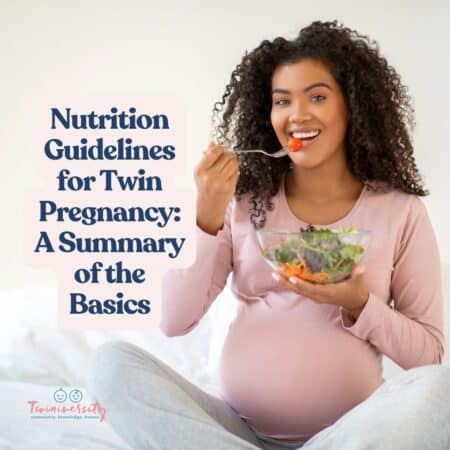Last updated on May 20th, 2024 at 02:19 pm
Learn what to expect with your infant twins week 31, including tips, tricks, and advice from real twin parents who have been there.
All content on this website, including medical opinion and any other health-related information, is for informational purposes only and should not be considered to be a specific diagnosis or treatment plan for any individual situation. Use of this site and the information contained herein does not create a doctor-patient relationship. Always seek the direct advice of your own doctor in connection with any questions or issues you may have regarding your own health or the health of others.
Your Twins Week 31
Welcome back returning twin parents! Hello and welcome to the new twin parents who are just finding us today!
You made it through your first six months as a twin parent and you’re now heading into your seventh month of twin parenthood. What a huge accomplishment! Little known secret: we knew you could do it!
Now what? Well, this is a good place to start. We have plenty of information and resources to help you navigate twin parenting with your twins week 31.
Our twin parenting tips come from our very own experienced twin parents from around the world! These parents have all been there, done that, and are ready to share their tips and tricks with you.
These first months are full of excitement, questions, and even some anxiety. Not to worry, we’ve got your back. We’ve laid out all our best tips, tricks, and advice for twins week 31.
Got preemies? Make sure to consider your premature twins’ corrected age when reviewing whether or not they are meeting their milestones at appropriate times. In the vast majority of cases, preemies catch up by school-age and go on to succeed at the same level as their peers. Read more about preemie developmental milestones here

What to Expect with Twins Week 31
- At 7 months old, your twinnies may have doubled their birth weights! They are more sociable than ever and love to be with people. They’ll be smiling and laughing with close family and friends that are familiar but they may be shy with new faces.
- If your twins use pacifiers, make sure to toss out their 0-6 month pacifiers and invest in a set of 6+ month pacifiers (buy on Amazon). The 6+ month size ensures the proper development of baby’s palate, teeth, and gums as baby grows, plus a larger shield for their growing faces.
- Separation anxiety may start to set in. Your twins will become more clingy and may hate to be without you. This behavior is completely normal, but frustrating, especially when you’re caring for two babies alone! If you’re really struggling with this, you may want to invest in a twin baby carrier (this is a popular one)
- Your babies may start to show preferences of parent or caregiver. Try not to take it personally and work on better balancing out the baby care. If your twins only seem to want you and your partner is getting the cold shoulder, plan special times for your partner to spend alone with them (book time before bed is a great moment for this!) Plan 1-on-1 outings where one parent just takes one baby (having two single strollers is great for this). This is a great opportunity to bond with each baby alone and ideally should continue throughout their childhood.
- You’re probably doing 5 to 6 feedings of up to 8 ounces of breastmilk or formula a day (every 4 – 5 hours). If they have started solids you’ll notice a change in their poop in consistency and smell. Just when you thought poop couldn’t get more gross, it does! Look for stools that are too hard (constipation) or too loose (diarrhea) and talk to your pediatrician about this, including if you notice mucus or blood in the stool.
- You’ll soon notice your twins have more control over their hands and they’re interested in passing items from hand to hand. With this improved grasp, give your twins a variety of toys and board books to manipulate and encourage the right way to use them by demonstrating for them.
- The idea of object permanence — that an object is there even if not visible — begins to develop at this time. Playing peek-a-boo games and hiding toys inside containers for them to find will entertain your twins to no end!
- Your twins are becoming more curious and they’ll start to move towards objects they want with no concern for safety. We highly recommend that you get babyproofing finished ASAP if you haven’t already. You’ll want to baby proof every room in your house but each room will need a different variety of babyproofing tools. If you’re not a handy person you may want to hire a professional babyproofer to come in and set you up. Read more about making your home safer here
- When your twins start moving around in their crib you know it’s time to move the crib mattress to the bottom position.
- You can introduce a trainer cup to your twins. Practice with water at meals to help them get the hang of using their new cups. Start with a cup that has handles like this one

Want to be the first to know about giveaways, deals, and more just for twin parents? Sign up for the Twiniversity email list! Subscribe today to get emails about giveaways, events, weekly article roundups, and more! Pregnant with twins? We’ll be sending you a weekly twin pregnancy email to keep you on track with your pregnancy to-do list! Click here to learn more… and while you’re at it, check out our Complete Baby Safety Course and Twin Parent Memberships.
Common Concerns From the Moms Who Have Been There With Twins Week 31
- How can we smoothly transition to solid foods when our twins hate it?
- How can I encourage my twins to crawl?
- How can I keep my twins occupied at the same time?
- Should my twins be sleeping through the night yet?
- When should we worry about one twin not meeting milestones with the other?
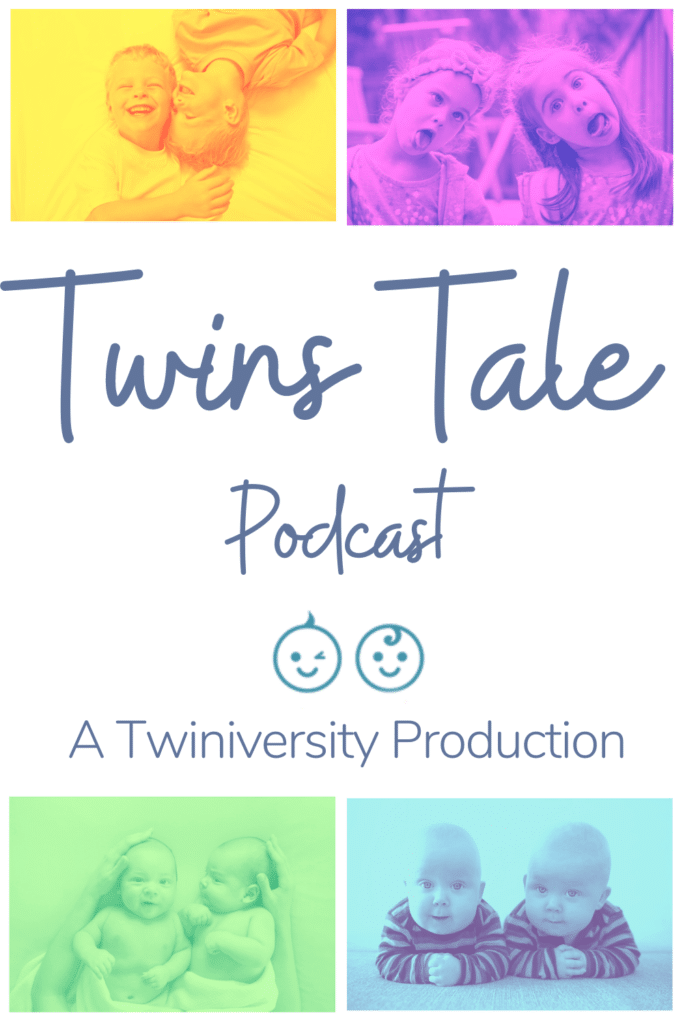
The Twins Tale Podcast by Twiniversity is an intimate look into the lives of twin parents and their twins at all ages and stages, from birth through college. We interview twin parents in the trenches and ask all the burning questions you want to know about raising twins: schedules that work, feeding your twins, getting out of the house, finding sanity, and so much more. Subscribe for FREE today!
Milestones & Developmental Leaps Parents Have Noticed With Twins Week 31
What’s going on with development in twins week 31?
- You might notice a bit of separation anxiety as your twins enter this next leap. It will pass before you know it. Just hang in there.
- One or both of your twins may be showing signs of getting their first tooth. They may be fussy, drooling, and irritable as they begin teething. Read more tips for teething here
- You twins are more mobile than ever. Even if they aren’t crawling yet, they may be scooting across the floor. Have you started babyproofing yet? Read about keeping your twins safe around the house here
- Once that first tooth breaks through it’s time to start brushing. Start slow with a child-sized toothbrush (buy on Amazon). You may opt to use a smear of fluoride-free toothpaste (buy on Amazon) about the size of a grain of rice.
- Your twins may be sitting up with a little help now. Don’t worry if they don’t just yet, though. The average is usually around 9 months.
- Your babies may begin to hold their own bottles and pacifiers around now.
- Your twins may be getting themselves into the crawl position as they try to figure out how to move on their own. They may rock on all 4’s as they trying to get going. Now is the time to childproof! Learn more about childproofing here
- Your babies probably recognize their names by now.
- Your twins will pass objects from one hand to the other.
- Your twins should bear weight when brought to a standing position. You may even see them bouncing on their legs.
Inform your doctor if your child:
- Shows no affection for caregivers
- Doesn’t try to get things that are in reach
- Doesn’t respond to sounds around him
- Has difficulty getting things to his mouth
- Doesn’t make vowel sounds (“ah”, “eh”, “oh”)
- Doesn’t roll over in either direction
- Doesn’t laugh or make squealing sound
- Seems very stiff, with tight muscles
- Seems very floppy, like a ragdoll
While most babies begin teething around six months, that first tooth can appear anytime between three and 14 months. Teething babies often want to chomp on things, so the pressure of an emerging tooth beneath the gums can be relieved by counter pressure. When the tooth moves through the bone and gum, it tends to come in stages, with more activity at night than during the day, so a baby may be more irritable in the evening. Chilled teething rings and a clean finger rubbed gently along the gums can provide some soothing relief.
Parents can find relief for their little one’s painful gums and irritability with a plant-based homeopathic medicine like Colic plus Soothing Drops. This teething medicine made by Culturelle also helps with minor digestive upsets sometimes associated with teething.* Colic plus Soothing Drops does not contain benzocaine, and it will not numb your baby’s gag reflex or interfere with nursing. The pre-measured liquid dose is simply squeezed into the baby’s mouth so there is no need to rub on gums.
*Claims based on traditional homeopathic practice, not accepted medical evidence. Not FDA evaluated.

Challenges You Might Experience With Twins Week 31
There are some challenges to look out for with twins week 31
- Keeping up with twins as they become more mobile presents new challenges.
- Teething is likely rearing its ugly head with your twins about now. Learn about our top 10 products to Learn more about relieving your twins teething symptoms here
- Many parents report trouble getting their twins to nap around this time. See how some twin parents Learn how some twin parents get their twins to nap here
- Night time routine is hard but very important for your sanity. Read more about creating a sleep routine here
- You might be craving some adult interaction around this time as you are falling into a bit of a routine. This is a great time to connect with local moms, especially other twin moms for your own sanity. Learn more about joining a twin mom club here
- This can be a challenges time for twin parents to create a healthy work/family balance. Read more about creating that balance here
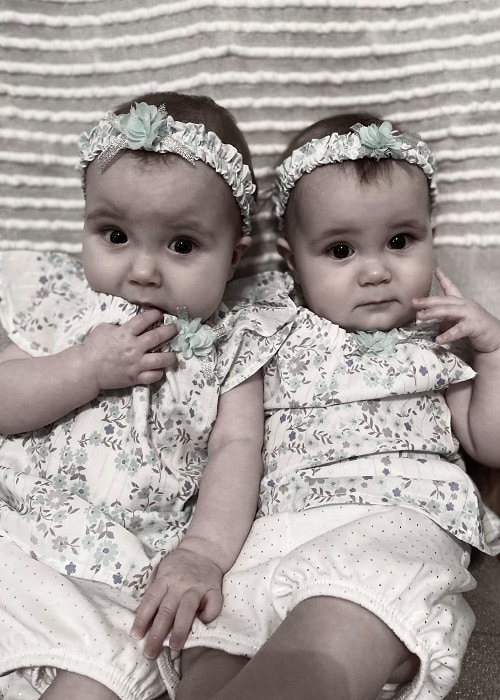
Tips from Parents of Twins Week 31
Take some tips from experienced twin parents!
- Embrace change.
- Baby proof now.
- Sleep train as soon as possible.
- Take pictures and videos.
- Keep offering foods, even if they don’t seem to like them at first.
- Get out on your own when you can.
Personal Advice from Parents of Twins Week 31
“Schedule is key. Let them play and tackle each other as long as they are safe and no one is crying – free time for mommy to do something. Baby proof their room so it is safe and they can navigate freely. Maybe try pouches of solid foods rather than spoon feeding all of them to make life easier. Bathe in the winter only every 3 days to avoid dry skin.”
Stephanie L.
“Continue to try to feed at same time whenever possible. Try to remember they are different babies and you shouldn’t compare them when it comes to milestones. If they are preemies, remember to age adjust. If you hear them make noise on the monitor but aren’t crying, let them figure out how to get back to sleep. Try lots of different foods and do repeated exposure.”
Liz R.
“Sound machines in their room is a must. Nighttime diapers will save you A LOT of mid-night pajama changes. Have your phone ready to take pictures and videos because they really start to talk and laugh at each other. Introduce them to a variety of foods. ALWAYS use zip-up pajamas.”
Michaela P.
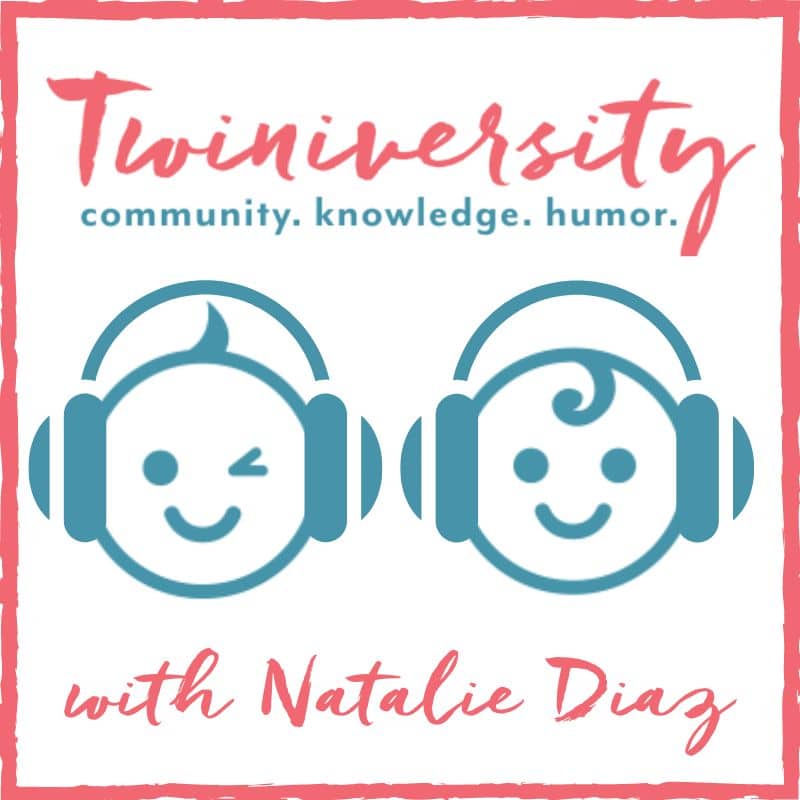
Got twins? Us too! The Twiniversity Podcast with Natalie Diaz was created BY parents of twins FOR parents of twins, from your pregnancy days through your twin’s teenage years, this podcast covers it all. It’s all about parenting twins, offering plenty of strategies for making life better, parenting hacks, and, of course, humor. We are laughing WITH you every step of the way.
Questions You Might Have for Your Pediatrician About Your Twins Week 31
The American Academy of Pediatrics (AAP) recommends babies get doctor checkups at birth, 3 to 5 days after birth and then at 1, 2, 4, 6, 9, 12, 15, 18 and 24 months. Reminder that twins = two co-pays for each doctor’s visit.
- What is the best brand of baby food?
- How much and how often should we be feeding solids at this age?
- What is the best way to sleep train twins?
- When can we give water to our twins?
- Are my twins old enough for a sippy cup yet?
You Might Want These Items for Your Twins Week 31
- Twin Go twin baby carrier (buy on Amazon)
- MAM Pacifers for 6+ months (buy on Amazon) — throw out the 0-6 month pacifiers
- Expandable Play Yard (buy on Amazon)
- Bath kneeler and elbow rest (buy on Amazon)
- Baby bath seat (buy on Amazon)
- Bath toy storage (buy on Amazon)
- Bath toys (buy on Amazon)
- Baby hair rinsing pitcher (buy on Amazon)
- Bath spout cover (buy on Amazon)
- Infrared forehead thermometer (buy on Amazon)
- Toy keys (buy on Amazon)
- Toy cell phone (buy on Amazon)
- Baby musical toys (buy on Amazon)
- Mesh chewers for soft fruits and veggies (buy on Amazon)
- Baby bowls, spoons, and plates (buy on Amazon)
- Childproofing items (buy on Amazon)
- Dr. Brown’s Cheers 360 Trainer Cup (buy on Amazon)
- MAM Learn to Brush Set (get two — buy on Amazon)
- Tom’s of Maine Fluoride-Free Strawberry Toothpaste (buy on Amazon)
- Fisher-Price Jumperoo (buy on Amazon)
- Summer Infant Pop N’ Jump portable activity center (buy on Amazon)
- Evenflo Exersaucer 3-in-1 (buy on Amazon)
- Evenflo Doorway Jumper (buy on Amazon)
- Fisher-Price Kick and Play Piano Gym (buy on Amazon)
- Munchkin Mozart Music Cube (buy on Amazon)
- Soft sensory books (buy on Amazon)
- Double stroller (check out our double stroller guide here)
- Structured baby carrier (buy on Amazon)
- Teethers (buy on Amazon)
- Teething biscuits (buy on Amazon)
- White noise machine (buy on Amazon)
- High chairs (buy on Amazon)
- Romp & Roost LUXE Playard (learn more)
- Love to Dream Transition Bag for when they start to roll (buy on Amazon)
- NoseFrida the “Snotsucker” (buy on Amazon)
- Baby toys like the Whoozit (buy on Amazon), the Winkle (buy on Amazon), Take Along Tunes (buy on Amazon), and a floor mirror (buy on Amazon)
- For more recommended baby products, click here
You Might Want These Items for Yourself
- Twins monthly milestone baby blanket (buy on Amazon)
- Milestone baby photo cards (buy on Amazon)
- Self-care items such as makeup, hair products, new clothes, or anything to make you feel human again
Feeding and Nap Schedule for Twins 7 Months Old
A schedule with twins 7 months old is key! Now that your twins are becoming more demanding of your time and attention, scheduling and organization is more important than ever!
Here is a suggested feeding and nap schedule for twins 7 months old. You can see that adding tummy time and play time before each nap is a good way to ensure they are getting enough of it throughout the day.
- 7:00 – Wake up time! First feeding of the day (bottles)
- 8:00 – Tummy time and play
- 9:00 – Nap (2 hours)
- 11:00 – Wake up and feeding (bottles)
- 11:30 – Tummy time and play
- 12:00 – Solids
- 1:00 – Nap (2 hours)
- 3:00 – Wake up
- 4:00 – Feeding (bottles)
- 4:30 – Tummy time and play
- 5:00 – Solids
- 5:30 – Bath time
- 6:00 – Book time & final bottles
- 6:30 or 7:00 – Bedtime
Do the best you can every day to keep them on the same feeding and sleeping schedule. When you get off track try again for the next feeding or nap.
Do everything in your power to feed your twins together to make sure you get breaks. If they are on opposite feeding schedules, you will never get a break — and you deserve one!
Sleep Advice From the Sleep Lady
If you’re beginning to feel like your twins 7 months old may never get the hang of consistently sleeping through the night and napping on any kind of schedule, you aren’t alone. You may feel like they will ALWAYS need you to be within arms reach in order to fall asleep and stay asleep. We can assure you that eventually things really DO get better with twins!
The Sleep Lady, Kim West, LCSW-C says: “Having a baby is akin to having a human alarm clock. Both wake you up with sudden noise, but what happens when your baby suddenly begins to wake earlier and earlier? Sure, the average baby wakes ‘early’ by most adult standards. Believe it or not, sometime between 6:00 and 7:00 a.m. is a biologically appropriate time for your child to wake up. If your baby is bright eyed and ready to play at 5:00, or worse, 3:00 a.m., you have to resolve early rising.
Early rising is common for babies and toddlers — and even some preschoolers. Luckily, it’s also normally a fairly easy fix, once you’ve identified the problem.”
See more of what The Sleep Lady Recommends about your newborn twins’ sleep here.
When to Call the Doctor
It’s better to overreact 100% of the time than to underreact once.
Natalie Diaz, Twiniversity Founder and Mom of Twins
All content on this website, including medical opinion and any other health-related information, is for informational purposes only and should not be considered to be a specific diagnosis or treatment plan for any individual situation. Use of this site and the information contained herein does not create a doctor-patient relationship. Always seek the direct advice of your own doctor in connection with any questions or issues you may have regarding your own health or the health of others.
When it comes to calling your doctor or seeking medical advice, you have to learn to trust yourself. No one knows your babies like you do. If you feel something isn’t right, it probably isn’t when it comes to your twins 6 months old. When in doubt, call. That’s why the offices have an answering service and staff on call at night or on the weekends.
That being said, there are a few guidelines to follow. There are a few circumstances under which you should call your doctor and get medical advice, or even call 911. When you call you should have a pen and paper handy and be prepared to give the following information over the phone:
- Immunization records
- Any medications, dosages, and times last taken (even over the counter drugs)
- Medical history
- Your baby’s temperature
- Mention that the baby is a twin, in case of a contagious illness
Any time you see the following symptoms with your twins you should contact your pediatrician immediately.
- Blood in vomit
- Blood in stool
- Seizure
- Suspected poisoning
- Bleeding you cannot stop
- Unable to move
- Limpness
- A rectal temperature of 100.4 or above
- Sleeps more than usual or will not wake up
- Yellow skin or eyes
Call your doctor as soon as possible if one or both of your twins experiences any of the following.
- Refusal to eat for multiple feedings in a row
- Diarrhea or vomiting
- A cold that will not resolve itself or gets worse
- Unexplained rash
- Signs of dehydration (no tears, no wet diapers, sunken eyes, sunken soft spot)
- Ear drainage
- Will not stop crying
When to Call 911
Please note that when you call 911, you and your baby will be taken to the nearest emergency room. This may or may not be located at your preferred hospital.
- Your baby is turning blue or taking more than 60 breaths per minute
- Your baby has a seizure which lasts more than 3 minutes or you cannot reach their doctor by phone immediately
- Suffers from convulsions, unconsciousness, or irregular breathing following a fall or from bleeding
- You think your baby may have a skull, neck, back, or pelvic fracture (DON’T move your baby)
- Your baby suffers from a compound fracture where bone is sticking out from the skin (cover it with a clean cloth and do not touch it)
- Your baby has bleeding you cannot stop after applying pressure for 10 minutes
Again, learn to trust your gut. When in doubt, call and see what your doctor thinks. Believe it or not, they’re happy to help.
What You Should Read for Twins Week 31
- Does My Baby Really Need to Crawl? The Benefits of Crawling
- How to Start Baby-Led Weaning for Twins
- 8 Tips for Running Errands with Twins
- You Know You’re a Parent of Twins When…
- Twin Dad Confession: I would not want my wife’s job.

Need some twin parent friends? Get the support you need with a Twiniversity Membership. Benefits include a monthly twin parent club meeting on Zoom, access to a private Facebook group just for twin parents, and a video library of twin parenting lessons. Visit Twiniversity.com/membership to join today!
Don’t Forget to Do These Things With Twins Week 31
You probably feel like you’re starting to fall into a bit of a routine with your twins 7 months old. At the very least, you’re probably beginning to settle into chaos as your normal. The good news is that it will continue to get better as time goes on! We have put together a few things to remember that will surely help you out in the coming weeks.
- Keep a master list. This is a great way to track schedules, important numbers and dates. It can be used as a guide for baby sitters, as well as for you when your having a “mom-brain” moment.
- Take TONS of pictures. Take pictures and videos of their first taste of solids, them interacting with each other, even at bath time with bubbles and toys! These picture will bring back fond memories for years to come.
- Don’t forget your marriage. The past 7 months have been a bit of a blur. This is a great time to reconnect with your partner. Get a sitter, get dressed up, and go out for the night. Even just an hour for a quiet coffee break will do wonders for your marriage right now!
- Get out with your girls. Call your friends, sisters, neighbors, whoever. Just make a plan and go out dancing with some friends. Leave the twins in the capable hands of your partner or parents and take the night off. You’ve earned it!
Are You a New Twin Parent?
Check out Natalie Diaz’s book:
“What To Do When You’re Having Two
The Twin Survival Guide From Pregnancy Through the First Year”
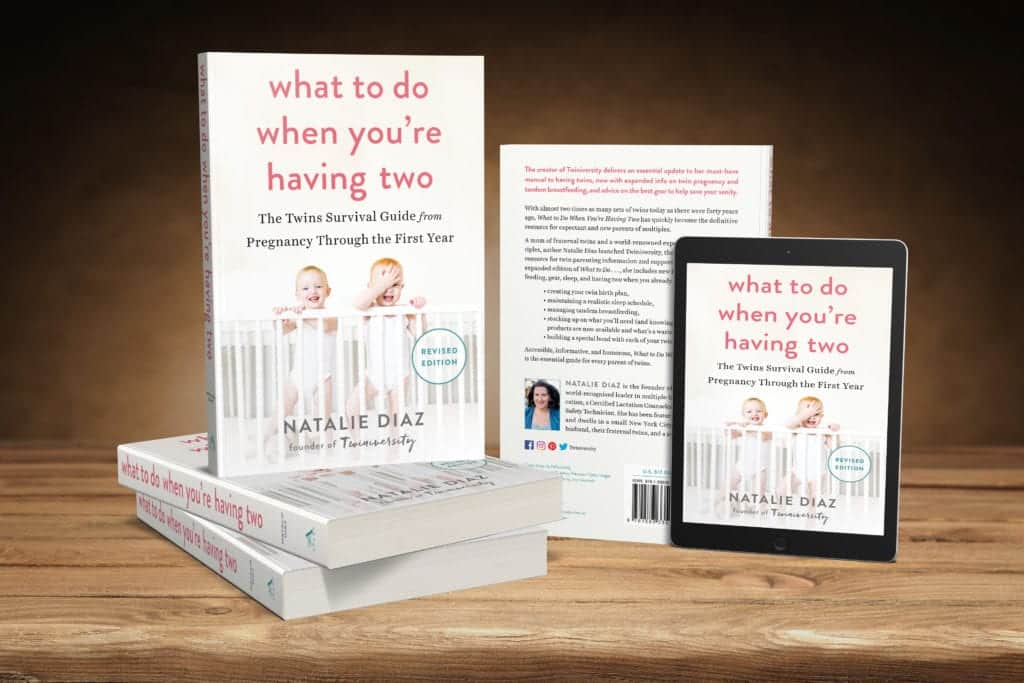
In What to Do When You’re Having Two: The Twins Survival Guide from Pregnancy Through the First Year, national twins guru and founder of Twiniversity (and twin mom herself!) Natalie Diaz provides a no-holds-barred resource about life with twins, from pregnancy and birth all the way through your duo’s first year of life.
Accessible and informative, What to Do When You’re Having Two
is the must-have manual for all parents of twins.
An excerpt from Twiniversity founder Natalie Diaz’s book, “What To Do When You’re Having Two“
What’s In Your Diaper Bag?
Like the Girl Scouts, the motto for all twin mamas should be, “Be Prepared.” Any mom of multiples can tell you that preparation and planning your day can make all the difference between chaos and calmness. To help you on your way to multiple parenting successes, I’ve organized a list of what your diaper bag should contain so you too can “Be Prepared.”
Your daily diaper bag should contain:
- one diaper for every two hours per baby that you will be out (plus four extra just in case)
- baby wipes in a closed bag (Kirkland/Costco make the best portable wipes)
- at least one set of clothing for each baby in a ziplock bag (in case of a liquid spill)
- a changing pad (disposable or standard)
- diaper cream (get a travel size just for your diaper bag)
- a few garbage bags (the small bags for dog poop are fantastic for this)
- an extra shirt for you! (we always forget about us)
- a blanket for each baby
- a hat (sunscreen too if baby is over six months)
- a bottle for each child (formula filled or powder filled). If you’re using powder, keep an extra serving in a Ziploc just in case.
- if your breastfeeding pack along some extra breast pads in case you start leaking
- burp cloths/bibs
- pacifiers plus spare or two. (On the Go Pacifier Wipes from One Step Ahead wouldn’t be such a bad idea either)
- enough baby food for one and a half servings PLUS a spoon for each kiddo (if they are older than 6 months)
- first aid kit (antibiotic spray, band aids, packet of Advil for you, $20 and insurance card copies for you and the twins along with emergency phone numbers)
- hand sanitizer and more hand sanitizer
- a few toys for the road!
Photos of Twins Week 31
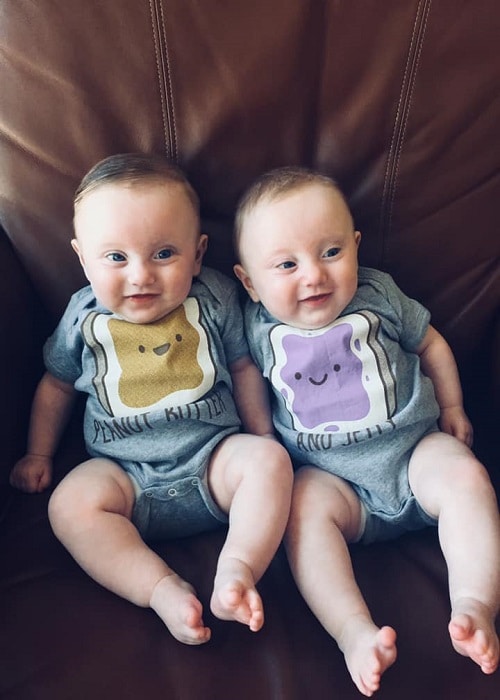



Return to the First Year with Twins Home
Sources
- Dr. Ilona Bendefy, Baby: Day by Day
- Dr. Frans X. Plooij and Dr. Hetty van de Rijt, The Wonder Weeks
- Marple, Kate, and Dawn Rosenberg. “When to Call 911: How to Tell If Your Baby Needs Emergency Care.” BabyCenter
- “Newborn Baby: When to Call the Doctor.” Cleveland Clinic
- “How Often and How Much Should Your Baby Eat?” HealthyChildren.org
- “How Much and How Often to Feed Infant Formula?” CDC.org
- “7-Month-Old-Babys-Development” Whattoexpect.com
- “Physical Appearance and Growth: 4 to 7 Months.” HealthyChildren.org






